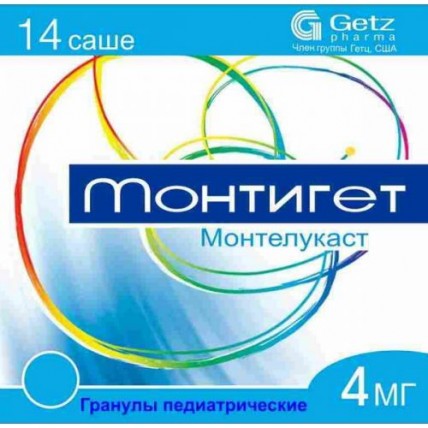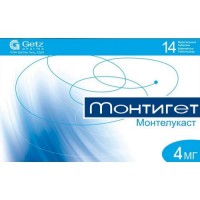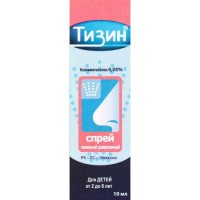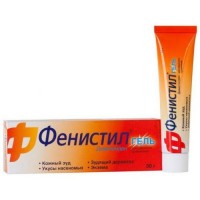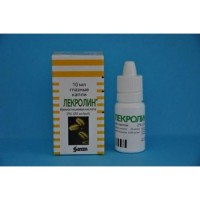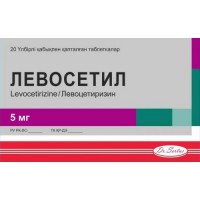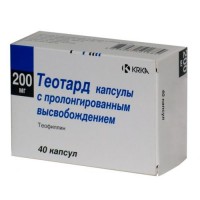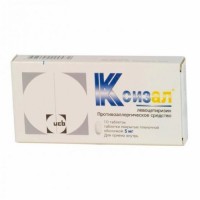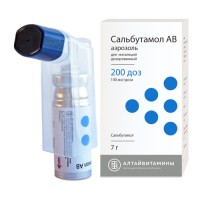Montiget 4 mg 14s granules pediatric sachets
- $41.50
The instruction
for medical use
of medicine
MONTIGET
the Trade name
of Montiget Mezhdunarodnoye the unlicensed
name Montelukast Dosage Form
of the Granule pediatric 4 mg
Structure
of One sachet contains
active agent - sodium of montelukast of 4.16 mg (it is equivalent to montelukast of 4 mg),
excipients: Mannitolum, a gipromelloza, magnesium stearate, fragrance with aroma of cherry, the water purified.
The description
the White or almost white granulated powder.
Pharmacotherapeutic group
Other drugs for treatment of obstructive respiratory diseases for system use.
Leukotriene receptors antagonists.
The code of automatic telephone exchange RO3DC03
the Pharmacological
Pharmacokinetics Montelukast properties of sodium is quickly soaked up after intake. The maximum plasma concentration are reached in 2-4 hours after administration of drug. The bioavailability of montelukast at intake is 64%.
More than for 99% montelukast of sodium contacts proteins of blood plasma. Plasma elimination half-life at healthy adults makes from 3 to 5.5 hours. The pharmacokinetics of montelukast keeps linear character at intake of doses higher than 50 mg. At intake of montelukast in morning and evening hours of differences in pharmacokinetics it is not observed.
Montelukast of sodium is actively metabolized in a liver through the system of P450 cytochrome by CYP3A4, CYP2A6 and CYP2C9 isoenzymes. Therapeutic plasma concentration of montelukast of sodium do not inhibit isoenzymes 3A4, 2C9, 1A2, 2A6, 2C19, or 2D6.
The plasma clearance of montelukast is about 45 ml/min. at healthy adults. Montelukast of sodium is removed with excrements and bile.
Children, patients of advanced age and patients with a renal failure have similar pharmacokinetic parameters with healthy adults.
At patients with a moderate liver failure and clinical manifestations of cirrhosis the metabolism of montelukast slows down and extended elimination half-life: AUC (the area under a curve of plasma concentration) increases by 41% after reception of a dose of 10 mg.
At children aged from 6 up to 11 months prolonged use of montelukast and variability of concentration in blood plasma was higher, than at adults. When studying pharmacokinetics at children aged from 6 up to 23 months safety and an admissible single dose of montelukast of sodium was similar in comparison with patients aged from 2 years and are more senior.
Montiget's pharmacodynamics the selection antagonist of receptors of D4 leukotriene (tsistenit CysLT1 leukotriene) - the most powerful mediator of the chronic persistent inflammation maintaining hyperreactivity of bronchial tubes in bronchial asthma.
Tsistenilovy leukotrienes (LTC4, LTD4, LTE4) - products of metabolism of arachidonic acid - are emitted from mast cells and eosinophils.
These eicosanoids connect tsistenit leukotriene receptors. Bronkhodilatiruyushchy action is connected with blocking leukotriene D4 receptors in airways and reduction of effect of the leukotrienes playing an important role in processes of regulation of reactivity of bronchial tubes, development of a bronkhokonstriktion, hypostasis of a mucous membrane of bronchial tubes, bronchial hypersecretion.
Drug blocks effect of LTD4 leukotrienes at the TsisLT1 level of receptors without agonistic action.
The therapeutic effect of Montiget begins to be shown during the first day of administration of drug.
Indications
- prevention and long-term treatment of bronchial asthma at children from 6 months are also more senior, including:
- prevention of day and night attacks of asthma
- treatment of aspirinzavisimy bronchial asthma
- prevention of the bronchospasm caused by physical activity
- seasonal allergic rhinitis at children from 6 months is also more senior
the Route of administration and
Montiget's doses is accepted once a day. Granules mix up with a small portion of soft food (about a size of the tablespoon) cooled to room temperature. The package should not be opened without preliminary preparation. After opening of a package the full dose of drug (to or without hashing with food) has to be used within 15 minutes. Not to store residues of drug with food for repeated use, they need to be thrown out. Not to dissolve pediatric granules in liquids. However liquids can be accepted after administration of drug.
The drug can be taken in time, to or after meal.
In Montiget's asthma it is necessary to accept in the evening. In seasonal allergic rhinitis time of reception is defined by the patient at discretion. The patients having at the same time asthma and seasonal allergic rhinitis have to accept Montiget once in the evening.
Patients have to take the drug is long both during the aggravation periods, and during the periods of remission of a disease.
To children from 6 months to 2 years with bronchial asthma: about 1 sachet of pediatric granules on 4 mg is appointed once a day.
Children are from 2 to 5 years old with bronchial asthma and seasonal allergic rhinitis: about 4 mg or 1 sachet of pediatric granules are appointed once a day.
Co-administration of Montiget in combination therapy of asthma
of Montiget can be added to treatment of the patients accepting bronchodilators and inhalation glucocorticosteroids (See the section
Medicinal interactions).
Montiget can be accepted in a combination with other means appointed earlier.
Montiget is appointed to patients with a bronchospasm if the clinical effect of the isolated use of bronchodilators is insufficient.
In case of achievement of adequate clinical effect (usually after reception of the first dose) the dose of the applied bronchodilators can be reduced.
Inhalation glyukokortikosterodida
Montiget's Use gives additional benefit to the patients using corticosteroid drugs a possibility of decrease in doses (under control of the doctor). At some patients the reception of inhalation glucocorticosteroids can be gradually completely cancelled. Sharp replacement of therapy with inhalation glucocorticosteroids with Montiget's appointment is not recommended.
Side effects
- reactions of hypersensitivity, including an anaphylaxis, a Quincke's edema, rash, an itching, urticaria and it is very rare - eosinophilic infiltration of a liver
- drowsiness, insomnia, a headache, hallucinations, a tremor, irritability, concern, excitement, including agressive behavior, fatigue, paresthesias/hypesthesias
- the increased sweating
- dryness in a mouth, nausea, vomiting, dyspepsia, abdominal pains, diarrhea
- myalgia, including muscular spasms
- hypostases, heartbeat, tendency to increase in bleeding, hypodermic hemorrhages
- dizziness, a shiver
- an arthralgia
- a grippopodobny syndrome, cough, sinusitis, pharyngitis
- increase in activity of hepatic transaminases
of the Contraindication
- hypersensitivity to montelukast of sodium or other components of drug
- a bad attack of bronchial asthma, including the asthmatic status
it is possible to appoint Medicinal interactions of Montiget together with other medicines which are traditionally applied to prevention and long-term treatment of bronchial asthma.
Treatment by bronchodilators: Montiget can add to treatment of patients at whom asthma is not controlled by use of some bronchodilators. At achievement of therapeutic effect (usually after the first dose) against the background of therapy by Montiget the dose of bronchodilators can be reduced gradually.
Inhalation glucocorticosteroids: treatment by Montiget provides additional therapeutic effect to the patients receiving treatment by inhalation glucocorticosteroids. At achievement of stabilization of a condition of the patient the dose decline of glucocorticosteroids is possible. The dose of glucocorticosteroids needs to be reduced gradually, under observation of the doctor. At some patients the reception of inhalation glucocorticosteroids can be completely cancelled. Sharp replacement of therapy with inhalation corticosteroids at Montiget's appointment is not recommended.
The recommended clinical dose of montelukast did not render clinically significant effect on pharmacokinetics of the following drugs: theophylline, Prednisolonum, oral contraceptives (ethinylestradiol/norethindrone 35/1), terfenadina, digoxin and warfarin.
AUC decreases at the persons who are at the same time receiving phenobarbital (approximately by 40%), however correction of the mode of dosing Montigeta is not required to such patients.
It is not recommended to appoint sodium montelukast to patients, including the children accepting Phenytoinum, phenobarbital or rifampicin.
Special instructions
It is necessary to observe the treatment mode accurately. It is not necessary to use for stopping of bad asthmatic attacks (does not replace inhalation bronchodilators), at emergence of therapeutic effect (usually after the first dose), the number of inhalations of bronchodilators can be within a day reduced.
It is impossible to replace with Montiget inhalation or oral glucocorticosteroids sharply. However the dose of an inhalation corticosteroid can be reduced gradually under medical observation.
Reduction of a dose of system corticosteroids (Prednisolonum, dexamethasone, betamethasone, Triamcinolonum) at the patients receiving antiasthmatic means, including antagonists of leukotriene receptors, was followed in rare instances by emergence of one or several of the listed phenomena: eosinophilias, vascular rash, aggravation of symptoms from a respiratory system, cardiological complications and/or the neuropathy sometimes diagnosed as a syndrome of Charg-Strausa - a system eosinophilic vasculitis. Though to relationship of cause and effect of these undesirable phenomena with therapy by antagonists of leukotriene receptors it was not established, at decrease in a system dose of corticosteroids at the patients accepting Montiget it is necessary to be careful and make the corresponding clinical observation.
By Montiget it should not be used as monotherapy for treatment and control of asthma which is shown at physical activity.
Patients who have exacerbation of asthma after physical activity have to continue inhalation use - agonists in the usual mode for prevention and have to have an inhaler at themselves when it is required.
Montiget does not block the bronkhospastichesky answer to aspirin or other NPVS at the asthmatic patients sensitive to aspirin. Such patients have to continue to avoid intake of aspirin and other NPVS. The caution has to be observed when using Montiget's together with bronchodilatory therapy. When the clinical answer is obvious, bronchodilatory therapy has to be reduced.
The care at appointment as the patient with liver diseases is necessary.
The patients accepting montelukast have separate messages about emergence of suicide thoughts / suicide behavior, however relationship of cause and effect is not established with administration of drug.
Pregnancy and the period of a lactation
of the Research on Montiget's use for pregnant women were not carried out. During pregnancy drug can be used in exceptional cases when the expected advantage for mother exceeds potential risk for a fruit. The sodium montelukast secretion facts in maternal milk are unknown. In need of use of drug in the period of a lactation it is necessary to resolve an issue of the breastfeeding termination.
Medicine is intended to feature of influence of medicine on ability to run the vehicle or potentially dangerous mechanisms for use in pediatric practice.
Overdose
of Messages about overdose did not arrive.
Symptoms: it is possible to assume that, at Montiget's overdose there can be strengthening of side effects, such as abdominal pain, vomiting, drowsiness, headache, thirst or psychomotor hyperactivity.
Treatment: symptomatic. There are no data on a possibility of removal of montelukast by peritoneal dialysis or a hemodialysis.
The form of release and packing
On 525 mg of pediatric granules place in each sachet.
On 14 sachets together with the instruction for use in the state and Russian languages place in a pack from cardboard.
Storage conditions
Store at a temperature from +15 of C up to +30 C in the dry, protected from light place.
To store out of children's reach!
2 years
not to apply a period of storage after the expiration date specified on packing.
Prescription status
According to the prescription
the Producer Getz of Pharm (Pvt) Limited, Pakistan
29-30/27, K. I.A.
Karachi 74900,
Ph. + (92-21) 111,111,511
Fax: + (92-21) 350 5792
www.getzpharma.com
the Address of the organization accepting in the territory of the Republic of Kazakhstan claims from consumers on quality of products:
Getz of Pharm (Pvt) Limited in RK
Almaty, Shevchenko St., 148
ph. +7 (727) 378-51-89, 378-54-78
To develop representative office
for medical use
of medicine
MONTIGET
the Trade name
of Montiget Mezhdunarodnoye the unlicensed
name Montelukast Dosage Form
of the Granule pediatric 4 mg
Structure
of One sachet contains
active agent - sodium of montelukast of 4.16 mg (it is equivalent to montelukast of 4 mg),
excipients: Mannitolum, a gipromelloza, magnesium stearate, fragrance with aroma of cherry, the water purified.
The description
the White or almost white granulated powder.
Pharmacotherapeutic group
Other drugs for treatment of obstructive respiratory diseases for system use.
Leukotriene receptors antagonists.
The code of automatic telephone exchange RO3DC03
the Pharmacological
Pharmacokinetics Montelukast properties of sodium is quickly soaked up after intake. The maximum plasma concentration are reached in 2-4 hours after administration of drug. The bioavailability of montelukast at intake is 64%.
More than for 99% montelukast of sodium contacts proteins of blood plasma. Plasma elimination half-life at healthy adults makes from 3 to 5.5 hours. The pharmacokinetics of montelukast keeps linear character at intake of doses higher than 50 mg. At intake of montelukast in morning and evening hours of differences in pharmacokinetics it is not observed.
Montelukast of sodium is actively metabolized in a liver through the system of P450 cytochrome by CYP3A4, CYP2A6 and CYP2C9 isoenzymes. Therapeutic plasma concentration of montelukast of sodium do not inhibit isoenzymes 3A4, 2C9, 1A2, 2A6, 2C19, or 2D6.
The plasma clearance of montelukast is about 45 ml/min. at healthy adults. Montelukast of sodium is removed with excrements and bile.
Children, patients of advanced age and patients with a renal failure have similar pharmacokinetic parameters with healthy adults.
At patients with a moderate liver failure and clinical manifestations of cirrhosis the metabolism of montelukast slows down and extended elimination half-life: AUC (the area under a curve of plasma concentration) increases by 41% after reception of a dose of 10 mg.
At children aged from 6 up to 11 months prolonged use of montelukast and variability of concentration in blood plasma was higher, than at adults. When studying pharmacokinetics at children aged from 6 up to 23 months safety and an admissible single dose of montelukast of sodium was similar in comparison with patients aged from 2 years and are more senior.
Montiget's pharmacodynamics the selection antagonist of receptors of D4 leukotriene (tsistenit CysLT1 leukotriene) - the most powerful mediator of the chronic persistent inflammation maintaining hyperreactivity of bronchial tubes in bronchial asthma.
Tsistenilovy leukotrienes (LTC4, LTD4, LTE4) - products of metabolism of arachidonic acid - are emitted from mast cells and eosinophils.
These eicosanoids connect tsistenit leukotriene receptors. Bronkhodilatiruyushchy action is connected with blocking leukotriene D4 receptors in airways and reduction of effect of the leukotrienes playing an important role in processes of regulation of reactivity of bronchial tubes, development of a bronkhokonstriktion, hypostasis of a mucous membrane of bronchial tubes, bronchial hypersecretion.
Drug blocks effect of LTD4 leukotrienes at the TsisLT1 level of receptors without agonistic action.
The therapeutic effect of Montiget begins to be shown during the first day of administration of drug.
Indications
- prevention and long-term treatment of bronchial asthma at children from 6 months are also more senior, including:
- prevention of day and night attacks of asthma
- treatment of aspirinzavisimy bronchial asthma
- prevention of the bronchospasm caused by physical activity
- seasonal allergic rhinitis at children from 6 months is also more senior
the Route of administration and
Montiget's doses is accepted once a day. Granules mix up with a small portion of soft food (about a size of the tablespoon) cooled to room temperature. The package should not be opened without preliminary preparation. After opening of a package the full dose of drug (to or without hashing with food) has to be used within 15 minutes. Not to store residues of drug with food for repeated use, they need to be thrown out. Not to dissolve pediatric granules in liquids. However liquids can be accepted after administration of drug.
The drug can be taken in time, to or after meal.
In Montiget's asthma it is necessary to accept in the evening. In seasonal allergic rhinitis time of reception is defined by the patient at discretion. The patients having at the same time asthma and seasonal allergic rhinitis have to accept Montiget once in the evening.
Patients have to take the drug is long both during the aggravation periods, and during the periods of remission of a disease.
To children from 6 months to 2 years with bronchial asthma: about 1 sachet of pediatric granules on 4 mg is appointed once a day.
Children are from 2 to 5 years old with bronchial asthma and seasonal allergic rhinitis: about 4 mg or 1 sachet of pediatric granules are appointed once a day.
Co-administration of Montiget in combination therapy of asthma
of Montiget can be added to treatment of the patients accepting bronchodilators and inhalation glucocorticosteroids (See the section
Medicinal interactions).
Montiget can be accepted in a combination with other means appointed earlier.
Montiget is appointed to patients with a bronchospasm if the clinical effect of the isolated use of bronchodilators is insufficient.
In case of achievement of adequate clinical effect (usually after reception of the first dose) the dose of the applied bronchodilators can be reduced.
Inhalation glyukokortikosterodida
Montiget's Use gives additional benefit to the patients using corticosteroid drugs a possibility of decrease in doses (under control of the doctor). At some patients the reception of inhalation glucocorticosteroids can be gradually completely cancelled. Sharp replacement of therapy with inhalation glucocorticosteroids with Montiget's appointment is not recommended.
Side effects
- reactions of hypersensitivity, including an anaphylaxis, a Quincke's edema, rash, an itching, urticaria and it is very rare - eosinophilic infiltration of a liver
- drowsiness, insomnia, a headache, hallucinations, a tremor, irritability, concern, excitement, including agressive behavior, fatigue, paresthesias/hypesthesias
- the increased sweating
- dryness in a mouth, nausea, vomiting, dyspepsia, abdominal pains, diarrhea
- myalgia, including muscular spasms
- hypostases, heartbeat, tendency to increase in bleeding, hypodermic hemorrhages
- dizziness, a shiver
- an arthralgia
- a grippopodobny syndrome, cough, sinusitis, pharyngitis
- increase in activity of hepatic transaminases
of the Contraindication
- hypersensitivity to montelukast of sodium or other components of drug
- a bad attack of bronchial asthma, including the asthmatic status
it is possible to appoint Medicinal interactions of Montiget together with other medicines which are traditionally applied to prevention and long-term treatment of bronchial asthma.
Treatment by bronchodilators: Montiget can add to treatment of patients at whom asthma is not controlled by use of some bronchodilators. At achievement of therapeutic effect (usually after the first dose) against the background of therapy by Montiget the dose of bronchodilators can be reduced gradually.
Inhalation glucocorticosteroids: treatment by Montiget provides additional therapeutic effect to the patients receiving treatment by inhalation glucocorticosteroids. At achievement of stabilization of a condition of the patient the dose decline of glucocorticosteroids is possible. The dose of glucocorticosteroids needs to be reduced gradually, under observation of the doctor. At some patients the reception of inhalation glucocorticosteroids can be completely cancelled. Sharp replacement of therapy with inhalation corticosteroids at Montiget's appointment is not recommended.
The recommended clinical dose of montelukast did not render clinically significant effect on pharmacokinetics of the following drugs: theophylline, Prednisolonum, oral contraceptives (ethinylestradiol/norethindrone 35/1), terfenadina, digoxin and warfarin.
AUC decreases at the persons who are at the same time receiving phenobarbital (approximately by 40%), however correction of the mode of dosing Montigeta is not required to such patients.
It is not recommended to appoint sodium montelukast to patients, including the children accepting Phenytoinum, phenobarbital or rifampicin.
Special instructions
It is necessary to observe the treatment mode accurately. It is not necessary to use for stopping of bad asthmatic attacks (does not replace inhalation bronchodilators), at emergence of therapeutic effect (usually after the first dose), the number of inhalations of bronchodilators can be within a day reduced.
It is impossible to replace with Montiget inhalation or oral glucocorticosteroids sharply. However the dose of an inhalation corticosteroid can be reduced gradually under medical observation.
Reduction of a dose of system corticosteroids (Prednisolonum, dexamethasone, betamethasone, Triamcinolonum) at the patients receiving antiasthmatic means, including antagonists of leukotriene receptors, was followed in rare instances by emergence of one or several of the listed phenomena: eosinophilias, vascular rash, aggravation of symptoms from a respiratory system, cardiological complications and/or the neuropathy sometimes diagnosed as a syndrome of Charg-Strausa - a system eosinophilic vasculitis. Though to relationship of cause and effect of these undesirable phenomena with therapy by antagonists of leukotriene receptors it was not established, at decrease in a system dose of corticosteroids at the patients accepting Montiget it is necessary to be careful and make the corresponding clinical observation.
By Montiget it should not be used as monotherapy for treatment and control of asthma which is shown at physical activity.
Patients who have exacerbation of asthma after physical activity have to continue inhalation use - agonists in the usual mode for prevention and have to have an inhaler at themselves when it is required.
Montiget does not block the bronkhospastichesky answer to aspirin or other NPVS at the asthmatic patients sensitive to aspirin. Such patients have to continue to avoid intake of aspirin and other NPVS. The caution has to be observed when using Montiget's together with bronchodilatory therapy. When the clinical answer is obvious, bronchodilatory therapy has to be reduced.
The care at appointment as the patient with liver diseases is necessary.
The patients accepting montelukast have separate messages about emergence of suicide thoughts / suicide behavior, however relationship of cause and effect is not established with administration of drug.
Pregnancy and the period of a lactation
of the Research on Montiget's use for pregnant women were not carried out. During pregnancy drug can be used in exceptional cases when the expected advantage for mother exceeds potential risk for a fruit. The sodium montelukast secretion facts in maternal milk are unknown. In need of use of drug in the period of a lactation it is necessary to resolve an issue of the breastfeeding termination.
Medicine is intended to feature of influence of medicine on ability to run the vehicle or potentially dangerous mechanisms for use in pediatric practice.
Overdose
of Messages about overdose did not arrive.
Symptoms: it is possible to assume that, at Montiget's overdose there can be strengthening of side effects, such as abdominal pain, vomiting, drowsiness, headache, thirst or psychomotor hyperactivity.
Treatment: symptomatic. There are no data on a possibility of removal of montelukast by peritoneal dialysis or a hemodialysis.
The form of release and packing
On 525 mg of pediatric granules place in each sachet.
On 14 sachets together with the instruction for use in the state and Russian languages place in a pack from cardboard.
Storage conditions
Store at a temperature from +15 of C up to +30 C in the dry, protected from light place.
To store out of children's reach!
2 years
not to apply a period of storage after the expiration date specified on packing.
Prescription status
According to the prescription
the Producer Getz of Pharm (Pvt) Limited, Pakistan
29-30/27, K. I.A.
Karachi 74900,
Ph. + (92-21) 111,111,511
Fax: + (92-21) 350 5792
www.getzpharma.com
the Address of the organization accepting in the territory of the Republic of Kazakhstan claims from consumers on quality of products:
Getz of Pharm (Pvt) Limited in RK
Almaty, Shevchenko St., 148
ph. +7 (727) 378-51-89, 378-54-78
To develop representative office
